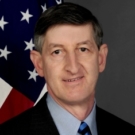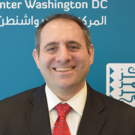Speakers

Jacob Walles
Nonresident Senior Fellow in the Middle East Program
Carnegie Endowment for International Peace
Moderator
Event Summary
On September 14, 2017, Arab Center Washington DC (ACW) presented a panel, “The Future of Gaza: Between Domestic and Regional Politics.” Speakers were Ambassador (ret.) Jacob Walles, a nonresident senior fellow in the Middle East Program of the Carnegie Endowment for International Peace, and Yousef Munayyer, executive director of the US Campaign for Palestinian Rights.
Introducing the two speakers, ACW’s executive director, Khalil Jahshan, said that Gaza has been neglected for a long time. Renewed diplomatic efforts to ease the Israeli siege and reconcile Hamas and the Palestinian Authority (PA) in Ramallah—controlled by the rival Fatah movement—were held recently in Cairo. “Central to this development,” Jahshan said, “is what is locally dubbed as the ‘Dahlan Plan’ or the ‘Ultimate Plan’ for Gaza,” spearheaded by the exiled former Fatah security chief in the strip, Muhammad Dahlan. This plan aims to lift the siege of Gaza, particularly by opening the border with Egypt, and revive the Gaza economy. Although the Hamas gathering in Cairo and the proposed Dahlan plan are significant, Jahshan noted, they cannot be divorced from regional politics unfolding in the Middle East.
Jahshan explained that the plan raises many questions regarding Fatah-Hamas reconciliation, the effectiveness of its strategy and the PA’s suspicions about it, Dahlan’s personal political agenda, the role and intentions of regional powers, and the regional implications of a Gaza deal for reviving larger Palestinian-Israeli negotiations.
Ambassador Jacob Walles said that although the long-term prospects for Gaza are “cloudy at best,” in the short term it is possible to improve the lives of Gazans. A “steady supply of electricity can make a huge difference in people’s lives,” referring to the severe shortage there. Reports of cooperation between Hamas and Dahlan could be positive for Gaza, he said, but Dahlan’s history when he was in charge of security in Gaza during 1994-2007 was characterized by brutality. “There’s a lot of old animosity and bad blood between the two sides,” Walles added.
What Dahlan does bring, he noted, is financial infusions from the United Arab Emirates ($15 million/month) and the possibility, with Egypt’s support, to permanently reopen the Rafah crossing. It was the new Hamas leader, Yahya Sinwar, who initiated the overture to Dahlan for his return. However, Hamas’s willingness to work with Dahlan, he said, shows its weak position and the tremendous pressure it faces from the PA, Israel, and Egypt.
PA president Mahmoud Abbas, whose relations with Egypt and the UAE are not favorable, has worked hard to thwart this controversial deal, Walles noted. Meanwhile, Egypt and the UAE have continued to support Dahlan, with Egypt’s primary interest being security, especially in the Sinai. The UAE has been working to displace Qatar from its role in Gaza and to reduce Iran’s influence, Walles explained, and these regional rivalries are playing out in Gaza—the UAE is trusting Dahlan to protect its interests. Egypt and the UAE may also be grooming him as Abbas’s successor.
Israel’s overriding interest in Gaza is security as well, said Walles. For now, Tel Aviv would go along with the Dahlan deal if it is in its interest, although the Israelis “seem to be staying out of the PA succession issue.” As for the United States, he noted that Gaza “is not on Trump’s agenda.”
Walles said that a notable aspect of the Dahlan plan is that it would “represent Gazans working together to solve Gazans’ problems, which we haven’t seen for quite a long time.” It remains to be seen whether the Dahlan plan is viable and has the potential to improve their lives, he concluded.
Dr. Yousef Munayyer emphasized that the central problem undergirding different actors’ approaches in Gaza since 2006 has been a “siege policy mentality,” namely, to “squeeze and squeeze and that’s how we will get Gaza and the people there and the people in charge there to do what we want them to do.” This has accelerated in the last several months because of the Trump Administration, the coalescence of Gaza’s political and military leadership in one physical space, and new agendas by the PA and Gulf states. In addition to being an “open air prison” he said that Gaza, with two million people, half of whom are under age 18, is “the most bizarre and inhumane sociopolitical experiment that the world has ever seen.”
All these policies ignore a key issue: “the crisis of legitimacy in Palestinian leadership,” going back to Yasser Arafat—who actually had far stronger domestic legitimacy than Palestinian leaders now, Munayyer asserted. There has been deterioration of Palestinian institutions since the Oslo process and Dahlan represents a further step in that direction. It is important for the Palestinians to reverse this trend and reinvigorate Palestinian national institutions, he added.
Abbas, elected in 2005, has faced the problems of the Hamas-Fatah divide since 2006-7 as well as internal Fatah rivalries. But even with the challenges regarding legitimacy for Abbas and Hamas, Munayyer continued, they were elected and put into power by Palestinians. In contrast, this plan would let outsiders insert a personality into Palestinian politics, which exacerbates the longstanding Palestinian crisis of legitimacy. In fact, the Dahlan plan would cement the divide between the West Bank and Gaza. He noted that only 17 percent of Gazans and only 1 percent of West Bank Palestinians support Dahlan.
Munayyer was skeptical about Egypt’s support of the plan because it wants someone in Gaza to “watch over Hamas,” or that Israel would think of Dahlan as a “reliable check on Hamas.” In reality, Israel’s policy has been to de-develop Gaza, particularly through its punishing siege since 2007. “It’s about a lot more than security for Israel,” he said of Tel Aviv’s policy regarding Gaza. As for the United States, he remarked that Washington has been silent and has neglected the situation. There is a lack of a long-term American vision, he said; therefore, it is unlikely that there will be meaningful change in Gaza anytime soon.


